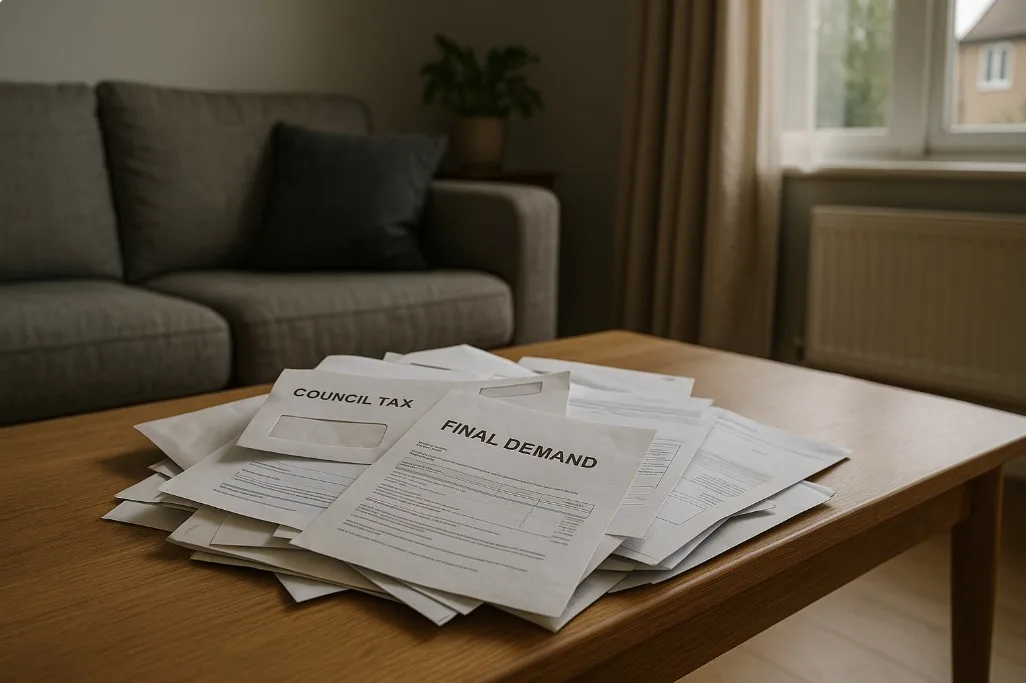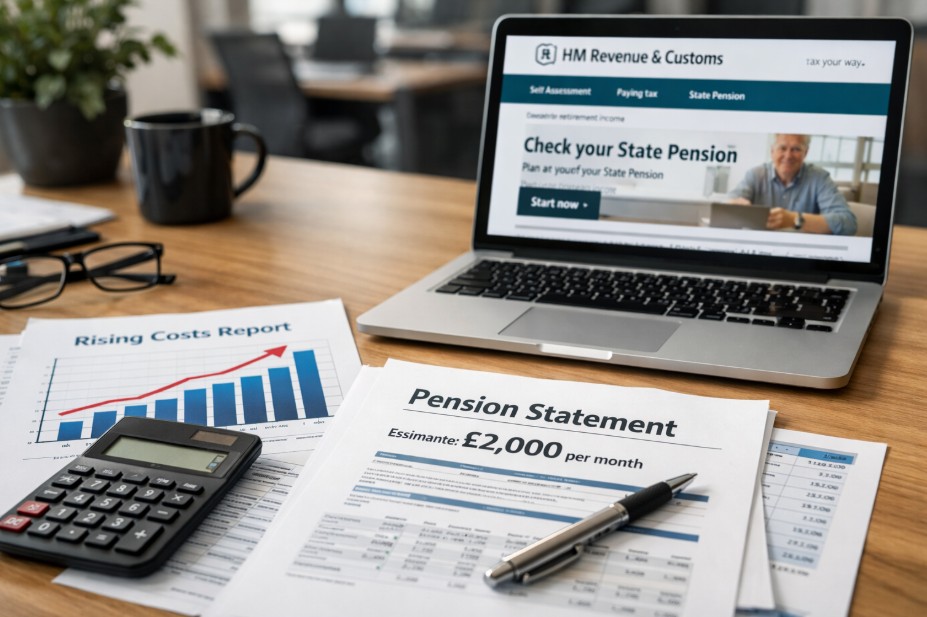Table of Contents
ToggleWhy Do People Ask How Long They Can Stay Without Paying Council Tax?
Many people wonder how long they can remain at an address without paying council tax. Is it days, weeks, or even months before local councils take action? The truth is there is no fixed amount of time someone can legally avoid paying. The consequences depend on where the person lives, whether they are liable to pay in the first place, and how quickly the local authority begins enforcement.
Council tax is not optional. It is a legal obligation for most adults in the UK and is treated as a priority debt. That means it must be paid before unsecured debts such as credit cards or overdrafts. Failing to pay can lead to legal action, asset seizure, and in rare cases, imprisonment. Yet despite its importance, many people are unclear about how council tax works, who needs to pay, and what happens when payments are missed.
This guide explores all aspects of council tax: what it is, how it is calculated, how long someone can stay at a property without paying, what happens when bills go unpaid, and the different exemptions and reductions available.
What Exactly Is Council Tax?
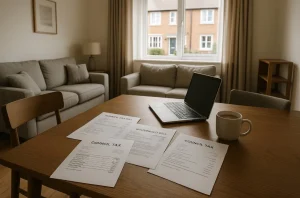
Council tax is a system of local taxation introduced in 1993 to replace the community charge, commonly known as the “poll tax.” Almost every residential property in England, Scotland, and Wales is subject to council tax. The money collected funds essential public services that residents rely on daily.
The annual bill is typically divided into ten instalments, paid from April to January. Some councils allow households to spread payments across twelve months. While this makes budgeting easier, it does not change the overall amount owed.
The amount payable depends on three main factors:
- The valuation band of the property, based on what it would have sold for at a set date in the past.
- The local authority’s annual budget requirements.
- The personal circumstances of the occupants, including whether they qualify for discounts or exemptions.
Council tax is not charged equally across the UK. For example, a household in band D in one region may pay significantly more than a household in the same band elsewhere because each local authority sets its own rates.
How Does Council Tax Work When Moving Into a Property?
When someone moves into a rented or owned property, they become liable for council tax as soon as they occupy the home, unless they fall into an exempt category. Councils usually send a bill within days or weeks of being notified of a new occupant.
This bill sets out the annual amount due and the instalment dates. Payments can be made online, by direct debit, bank transfer, or in some cases by telephone or post. Councils often encourage direct debit because it reduces the likelihood of missed payments.
If someone moves to a different council area, they must inform both their previous and new local authorities. This ensures they are not mistakenly pursued for payments at an address they no longer occupy. Failure to update records can create confusion, with councils chasing debts that are no longer valid.
How Long Can Someone Stay at a Property Without Paying Council Tax?
There is no official grace period during which someone can remain in a property without paying council tax. Liability begins as soon as a person becomes a resident, usually from the first day they move in. However, councils do not take immediate enforcement action the moment a payment is missed.
The enforcement process normally unfolds as follows:
| Stage | Council Action | Typical Timeline | Result |
| Missed payment | Account goes into arrears | Immediately | Reminder prepared |
| Reminder notice | Sent 14 days after missed payment | 14–21 days | Must clear arrears in 7 days |
| Final notice | Issued after further missed payments | 3–4 weeks | Whole year’s bill becomes due |
| Court summons | Council applies for liability order | 6–8 weeks | Legal proceedings begin |
| Liability order | Granted by magistrates | 8+ weeks | Council can enforce debt |
This means that while liability is immediate, enforcement typically begins within a few weeks. In many cases, action escalates within two months of non-payment.
What Happens If Someone Stops Paying Council Tax?
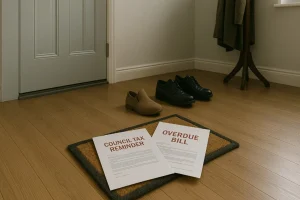
When someone stops paying council tax, the consequences can escalate quickly. Initially, councils send reminder letters. If these are ignored, the right to pay in monthly instalments is withdrawn and the full year’s bill becomes payable at once.
If the account still remains unpaid, the council applies to the magistrates’ court for a liability order. This legal order gives the council extra powers to recover the debt. With a liability order in place, councils can:
- Instruct enforcement agents (bailiffs) to recover the debt.
- Deduct money directly from wages through an attachment of earnings order.
- Deduct money from benefits such as Universal Credit or Jobseeker’s Allowance.
- Apply for charging orders against property.
- Add court costs and enforcement fees to the original debt.
In extreme cases, someone who deliberately refuses to pay, rather than being unable to pay, may face imprisonment for up to three months. Although this is rare, it highlights how seriously councils treat non-payment.
Can Guests or Lodgers Stay Without Paying Council Tax?
Many people are unsure whether guests or lodgers staying in their home are liable for council tax. The answer depends on the circumstances.
A short-term guest, such as a friend staying for a few days or a relative visiting for a week, is not expected to pay council tax. If they are already paying at their own permanent address, their temporary stay has no impact on your bill.
Lodgers, however, can affect liability. If you live alone and claim a single-person discount of 25%, this discount is lost if another adult moves in permanently. You must inform your council of the change, otherwise you risk a fine of up to £1,000.
The only exceptions are when the new occupant is a “disregarded person.” For example, students, carers, apprentices, and people with severe mental impairments are often excluded from council tax calculations. In such cases, your single-person discount may remain intact.
Can Someone Be Exempt From Paying Council Tax?
Yes. There are several situations where individuals or entire households do not need to pay council tax. Exemptions usually apply when the property is occupied only by people who are not considered liable.
Common exemptions include:
- Properties occupied solely by full-time students.
- Accommodation provided for armed forces.
- Homes where all residents are under the age of 18.
- Empty properties undergoing major repair or awaiting probate.
- Homes occupied exclusively by people with severe mental impairments.
If a property qualifies for an exemption, no council tax is payable until circumstances change. Councils usually review exemptions annually to ensure households remain eligible.
How Can Someone Qualify for a Council Tax Reduction?

Not every household is required to pay the full bill. Several types of reduction are available, depending on personal circumstances.
The most common is the single-person discount, which reduces bills by 25% for households with only one adult. In addition, councils run Council Tax Support schemes to help low-income households. These schemes vary by region but often reduce bills significantly for those in financial hardship.
There is also the second adult rebate, available when another adult living in the property has a low income. Unlike Council Tax Support, this reduction is based on the income of the second adult rather than the main householder.
Some people are disregarded for council tax purposes. This means they are not counted as adults when calculating liability. Disregarded categories include:
- Apprentices.
- Carers providing at least 35 hours of care a week.
- People with severe mental impairments.
- Students and student nurses.
If all but one of the adults in a household are disregarded, the household may be eligible for a 50% discount.
What If I Live With Someone Who Is Exempt?
Living with someone who is exempt does not automatically remove the need to pay council tax. Instead, the bill is adjusted according to how many liable adults remain in the property.
For example, if a working professional lives with a full-time student, the student is disregarded. This means the household is treated as having one liable adult, and the professional receives a 25% discount. If two professionals live with a student, the two professionals are jointly responsible for 100% of the bill.
This system ensures that liability is shared fairly, while recognising that some individuals should not be counted.
How Long Can Councils Chase Council Tax Arrears?
Unlike many debts, council tax arrears do not simply expire after a few years. Under the Limitation Act 1980, most unsecured debts become unenforceable after six years if no legal action has been taken. However, councils rarely allow arrears to reach this stage.
Once a liability order is granted, councils can pursue the debt indefinitely. This means old council tax debts can resurface many years later. Councils may instruct bailiffs or seek deductions from wages long after the original arrears were incurred.
For this reason, ignoring arrears is never advisable. Councils almost always act swiftly, often within weeks of missed payments.
What Should Someone Do If They Cannot Afford Council Tax?
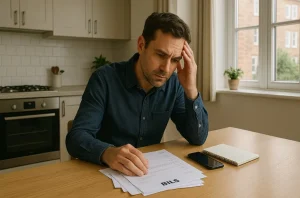
If someone cannot afford council tax, the most important step is to contact their local authority immediately. Councils are often willing to agree payment plans that spread arrears over a longer period. Ignoring the problem only makes matters worse.
Seeking independent debt advice can also help. Organisations such as Citizens Advice, StepChange, and National Debtline offer free support. They can assess whether you qualify for Council Tax Support, negotiate with councils on your behalf, or suggest formal debt solutions such as a Debt Relief Order or Individual Voluntary Arrangement.
Budgeting is another crucial step. Council tax should be prioritised over non-essential spending and non-priority debts. By treating it as a fixed expense, households can avoid enforcement action.
What If Someone Thinks Their Council Tax Band Is Wrong?
Council tax bands are based on property values from 1991 in England and Scotland, and 2003 in Wales. Mistakes occasionally occur, leading some households to pay more than necessary.
If you believe your band is wrong, you can challenge it by contacting the Valuation Office Agency. You may need to provide evidence, such as recent sales prices of similar homes in your area. If the VOA agrees, your property may be placed in a lower band, reducing your bill.
It is worth noting that if your home is already in the lowest band (band A), it cannot be moved down further. Beware of scams: the VOA never charges for band reviews, so companies offering this service for a fee should be avoided.
Can Landlords Be Held Responsible for Council Tax?
Landlords can sometimes be held responsible, particularly if a property is empty between tenancies. If a tenant moves out leaving unpaid council tax, the council will usually pursue the tenant. However, if records are incomplete, landlords may initially receive the bill.
For example, if a tenant leaves without notifying the council, enforcement agents may visit the property. This can cause issues for new tenants who had nothing to do with the debt. To avoid this, landlords should always inform councils promptly when tenants move in or out.
What Happens If Council Tax Bills Remain Unpaid?
If council tax bills remain unpaid, councils escalate enforcement until the debt is recovered. This can include:
- Taking money directly from wages or benefits.
- Sending enforcement agents to seize goods.
- Adding significant fees and court costs.
- Applying for charging orders against property.
- In rare cases, seeking imprisonment for up to three months.
Because council tax is a priority debt, it is always pursued before non-priority debts. For example, a household may fall behind on both council tax and credit card payments. In such cases, the council tax arrears must be cleared first to avoid legal consequences.
Final Thoughts: How Long Can Someone Stay Without Paying Council Tax?
There is no set period during which someone can legally avoid paying council tax. Liability begins as soon as someone moves into a property, and councils typically act within weeks of a missed payment. While exemptions and reductions exist, failure to pay without valid reason can lead to legal action, asset seizure, and in extreme circumstances, prison.
The key message is simple: do not ignore council tax. If you are struggling, contact your council, check eligibility for support, and seek debt advice. Dealing with the problem early prevents it from spiralling into long-term financial hardship.
Frequently Asked Questions About Council Tax
How soon will I receive a reminder if I miss a council tax payment?
If you miss a monthly payment, most councils send a reminder notice within 14 days. You will then have seven days to bring your account up to date. If you pay within this period, you can continue paying in instalments. If not, the entire year’s bill may become due at once.
Can unpaid council tax affect my credit rating?
Council tax arrears themselves do not usually appear on credit files. However, if the council obtains a liability order and enforcement action follows, the resulting court records can damage your financial profile. This may make it harder to obtain loans, credit cards, or a mortgage in the future.
Do students ever need to pay council tax?
Full-time students are exempt from council tax. However, part-time students may still be liable. If a household is mixed for example, one full-time student and one working adult, the working adult is responsible for the bill, though they may qualify for a 25% discount.
What happens if I don’t tell the council when someone moves in with me?
If you are receiving a single-person discount and another adult moves in, you must inform your council. Failing to do so can lead to backdated bills and a fine of up to £1,000. Councils regularly check household records and can investigate suspected cases of fraud or undeclared occupants.
Can landlords be forced to pay a tenant’s council tax debt?
Generally, tenants are responsible for paying council tax if they occupy the property. However, if a property is empty or records are unclear, councils may temporarily hold landlords responsible until the correct liable party is identified. Prompt communication with the local authority helps avoid such problems.
Is there a statute of limitations on council tax debt?
While many debts in the UK become unenforceable after six years under the Limitation Act 1980, council tax is different. Once a liability order has been granted, councils can chase the debt indefinitely. This means unpaid council tax from many years ago can still be collected.
Can council tax debt be included in a debt solution?
Yes. Council tax arrears can be included in formal debt solutions such as an Individual Voluntary Arrangement (IVA), Debt Relief Order (DRO), or bankruptcy. These options may help write off part of the debt or spread repayments over time. However, they should only be considered with professional debt advice.
Do people under 18 need to pay council tax if they are working?
No. Anyone under the age of 18 is exempt from paying council tax, regardless of whether they are employed. Liability begins from the age of 18, unless the individual qualifies for another exemption or discount.
What should I do if I believe my council tax bill is too high?
If you think you are being overcharged, first check whether you qualify for a reduction or exemption. If your banding seems incorrect, contact the Valuation Office Agency (VOA) to request a review. You will need to provide evidence, such as sale prices of similar properties in your area.
Can councils send bailiffs without warning?
No. Councils must first apply to the magistrates’ court for a liability order. Once granted, you will receive notice before enforcement agents are instructed. Bailiffs cannot appear without prior communication, and you will usually be given further opportunities to pay before visits occur.

